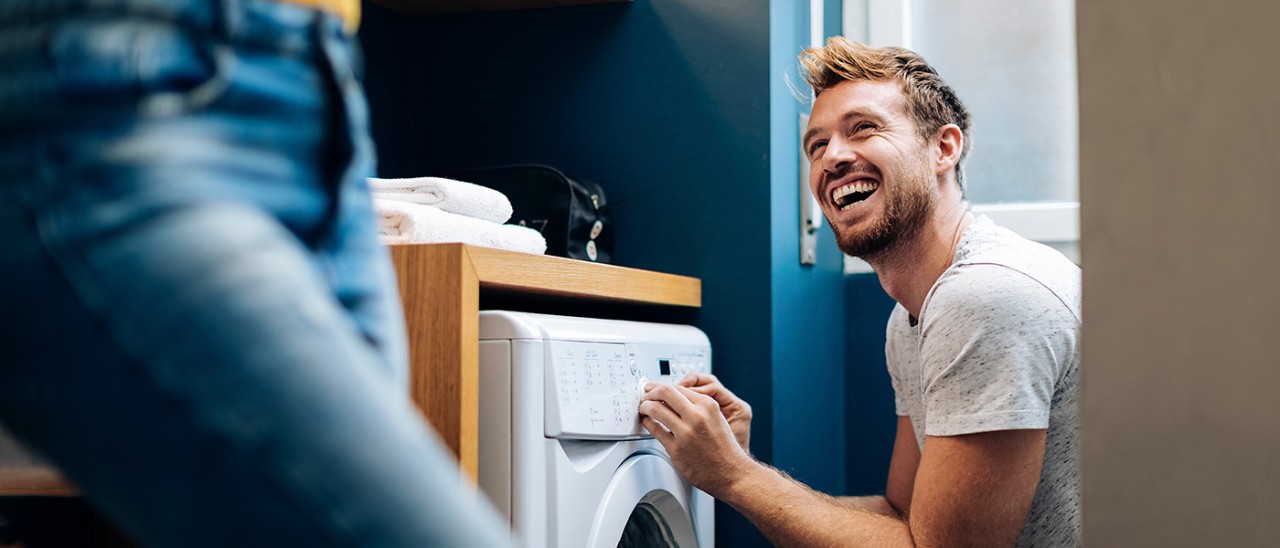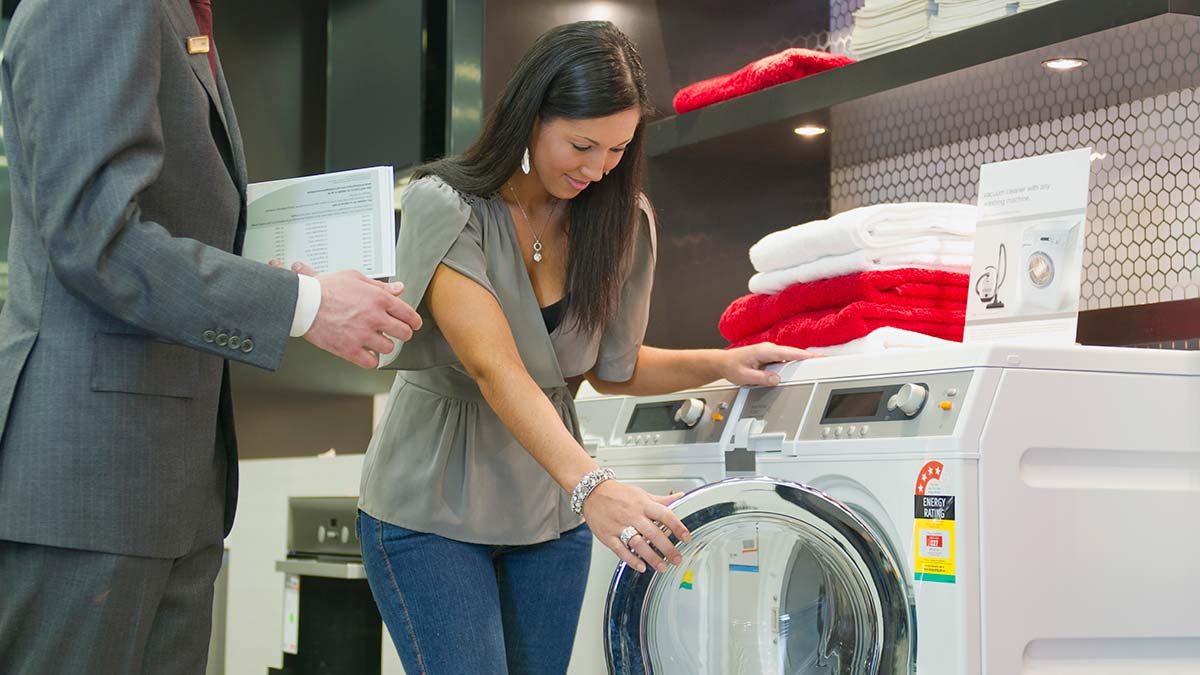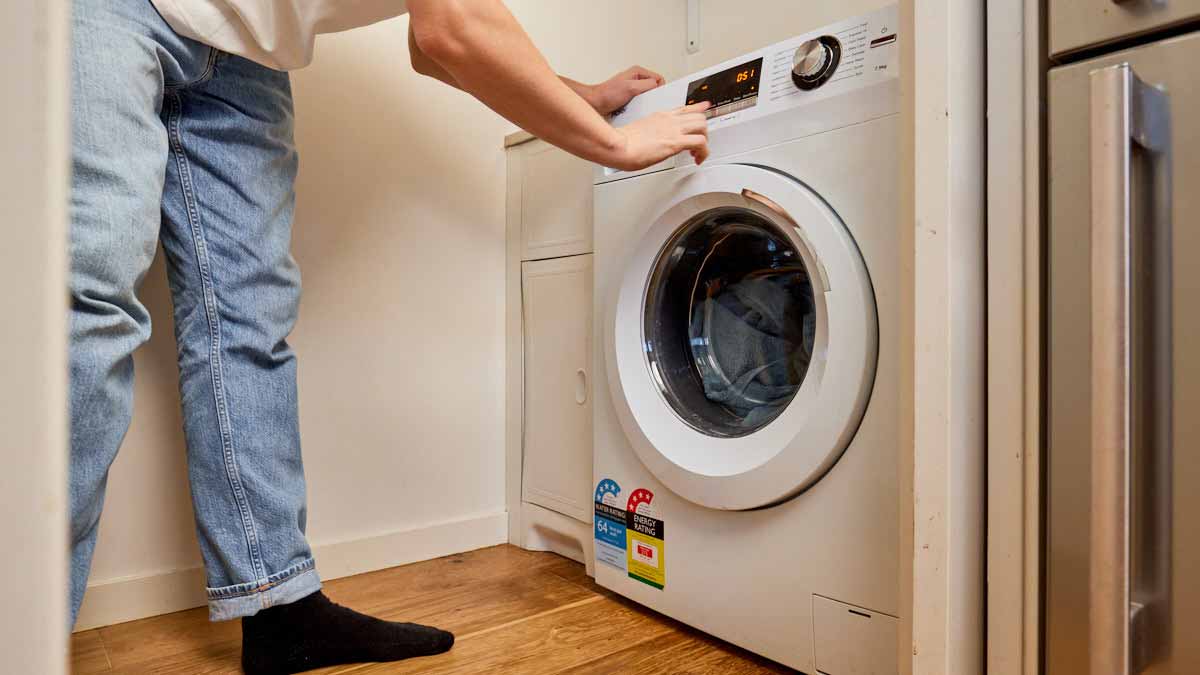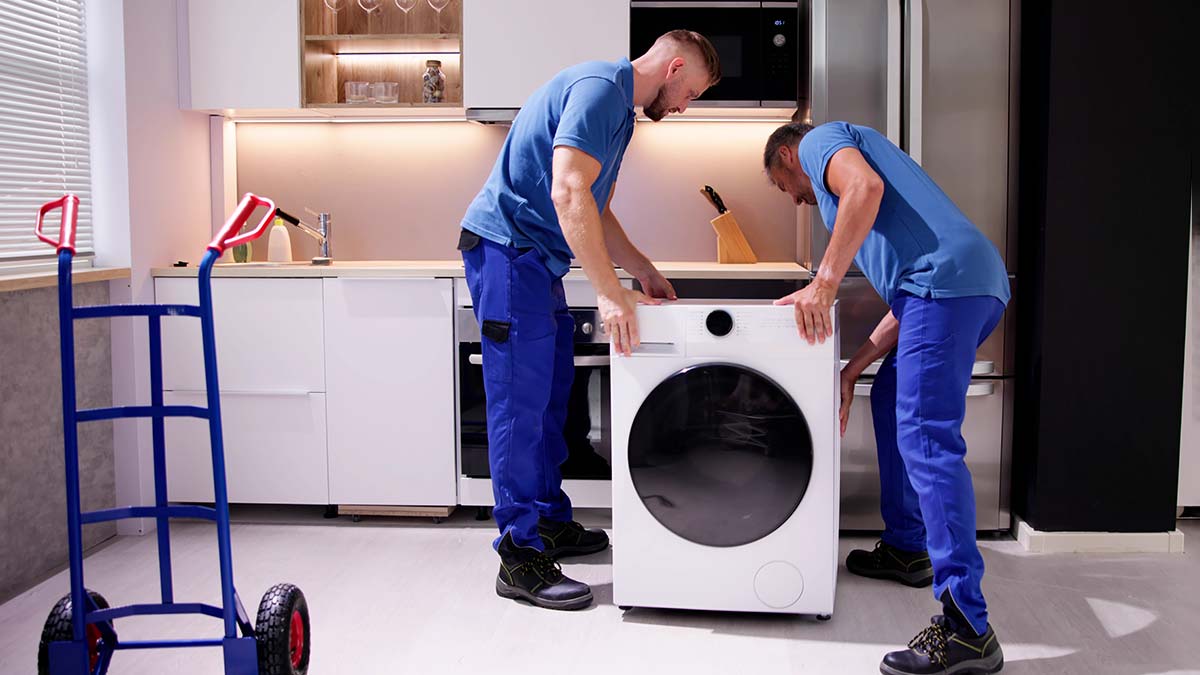Heat pump, vented and condenser clothes dryers all have pros and cons. Here's how to decide what type of tumble dryer is the best for you.
Front loader vs top loader washing machine guide: Which is best?

If you’re considering upgrading your washing machine or you want an energy efficient model to reduce costs, follow our step-by-step guide to get the right product for you.
Washing machines can last more than a decade, so it's wise to choose one that is energy efficient to help reduce your energy bills.
Along with determining how much space the appliance will take up in your laundry, pay attention to the ratings for energy efficiency and water usage to ensure you buy a washing machine that suits your needs. If you're buying a clothes dryer at the same time, find out the difference between heat pump, vented and condenser models.
Most washing machines are simple to install. If you're unsure, it's best to contact a licensed plumber. If you need a new power point, contact a licensed electrician.
If you have solar panels, run your washing machine and dryer during daylight hours so that you use your solar power as it is being produced, rather than paying for power from the grid at night. The addition of a solar battery will mean you can store solar power to use when you need it.
Looking for advice on home appliances?
Types of washing machines
Front loader vs top loader
The main types of washing machines on the market are front load washing machines and top load machines. But there are a number of different makes and models with varying features.
Front load washing machines
With a door on the front of the machine to load and unload clothes, these machines tumble your clothes in a horizontal drum, creating friction. They generally use less water per wash compared to top loader machines and a cycle often takes a bit longer to wash a load than top washers.
Top load washing machines
Top load washing machines have a door on the top of the unit. With an agitator in the centre, these machines twist to wash the clothes. They can be better for larger loads of washing, depending on the make and model.
Choosing an efficient washing machine
Energy efficiency
Every washing machine sold in Victoria must meet minimum energy performance standards and display an Energy Rating label. These stickers help you make an informed choice when buying a washing machine.
The appliance will include a star rating, estimated annual energy consumption for warm wash and cold wash, and the program time it takes to complete the program cycle. The more stars, the more savings.
Washer-dryer combos will display two Energy Rating labels: one for the washing function and one for the drying function.
Sustainability Victoria recommends choosing a machine with as high a star rating as possible for your price range.
Water efficiency
The water efficiency rating label indicates the washing machine's efficiency with a star rating from 1 to 6, where more stars mean higher efficiency and lower water usage.
For a new washing machine, Sustainability Victoria says to aim for at least a five-star water efficiency rating (and a four-star energy rating).

Machine size, capacity, and energy efficiency are all things to consider when it comes to a washing machine. Image: Getty
What to consider when buying a washing machine
Machine size
Your choice may depend on the size of your laundry. A standard front-loading washing machine typically measures 600-700mm wide, 600-700mm deep, and 800-900mm high, plus you need enough space for the door to open fully without obstruction.
Another consideration is to have a small gap (25mm) between the machine and adjoining walls or any other appliances for airflow and easier installation. There are top loaders on the market that are 515mm-520mm wide, if space is an issue.
If you want to stack a clothes dryers above to free up floorspace in your laundry, you'll need a front-loading washing machine.
Capacity
Capacity equates to the size of the drum. Most machines range from 6kg to 9kg. For singles or couples, a 6kg machine could do the job. If you have a child or two, you might need a 7kg or 8kg machine, while 9kg plus is best for larger families. But there are machines that run as large as 14kg capacity, which will take up more space in your laundry.
The more you need to wash, the greater capacity you will need. However, bear in mind that a larger machine will use more energy and cost more to run.
Spin speed
The faster the speed, the more water is removed from your clothes. A machine up to 1200RPM or 1600RPM is a good range.
Energy consumption
How much electricity your machine will use is important. Look for a cold wash cycle option as this can reduce energy use by up to 80 per cent, according to Sustainability Victoria. A programmable timer or delay start function also means you can set the machine to run at cheaper off-peak rates.
Also look at the energy rating label to find the annual energy use for daily normal warm wash cycles and use this to compare different brands and models.
Noise
Some machines are noisier than others, particularly in the spin phase. Depending on the location of your laundry, this could be an important factor to consider.
Settings
Sensitive wash, gentle spin and wool cycles are great, but there may be more smart settings on some models that might make your life easier.
Detergent
Most washing machines require you to manually fill the detergent drawer and estimate the amount needed based on the load size and dirtiness. However, there are washing machines with an auto-dosing function, that automatically senses the load weight and applies the right amount of detergent for optimal wash results.
Reviews
It can be worth having a look at online reviews before making a final decision on a washing machine. This can give you some insights into whether it has been a worthwhile purchase for others.

Before you buy, check the water and energy efficiency labels - seen here at the bottom of the washing machine.
Other washing machine features and costs to consider
Heating
Find out if the machine heats water internally or relies on hot or cold waster from the tap. Machines with both hot and cold water connections can import hot water from your water heater instead of heating it in the washing machine. Sustainability Victoria says this is more cost-effective if you have a gas, off-peak electric, or solar water heater. Remember that newer buildings often have different water connections to older buildings.
Cost
Most machines cost between $700 and $2000, with cheaper models often being less energy efficient. It is worthwhile shopping around, as it's a competitive market.
Finance
Most stores offer flexible payment options. Make sure you read the terms and conditions and find out if fees are charged for late repayments.
Warranty
Warranty periods are also worth considering. As a guide, most washing machines have a two-year manufacturer's warranty. Some makes and models may offer extended warranty periods, which can give you peace of mind.
Delivery
Some stores will deliver and install your appliance for free, as well as take away your old appliance. But this isn't always the case, so check before you buy, and factor in delivery and installation costs.
If you decide to transport the washing machine yourself, you need to consider your safety. Washing machines are heavy and awkward, and improper lifting can lead to injury. You need at least two people and the use of a hand trolley is recommended. Once in the vehicle, put lots of padding around the washing machine to protect it and make sure the load is strapped in and secure.

Many retail stores offer free delivery and installation. Image: Getty
How do I dispose of my old washing machine?
Many appliance retailers give you the option of having your old washing machine removed and taken away when they install your new one.
Otherwise, washing machines are regarded as e-waste, and therefore must be taken to an e-waste drop-off point to be recycled. You can find your nearest e-waste recycling point online.
Some councils also allow e-waste, including whitegoods, to be collected for recycling via their hardwaste collection services.
How do you clean a washing machine?
You will need to clean your washing machine at least every month or two. There are lots of small spaces that can grow mould and collect dirt if not cleaned.
Clean detergent that has built up over time, look inside the door and around the top of the machine for any grime, and give the inside of the machine a wipe with a damp cloth.
Also, check the drum and gasket for any loose items like coins or wrappers, and pout a sachet of appliance cleaner in the empty machine and turn on the machine and run one full normal cycle. This product can be purchased from supermarkets or hardware stores.
If you're a renter, does a landlord need to provide a washing machine?
In Victoria, rental properties typically don’t include washing machines. If there is a laundry on the rental property, the rental provider must ensure it’s connected to a reasonable supply of hot and cold water as one of 14 categories of minimum standards for rental properties.
RACV Trades is a trading name of RACV's trade partner, Club Home Response Pty Ltd (Victorian registered domestic building practitioner number CDB-U 100178). All works are performed or arranged by Club Home Response Pty Ltd. trading as RACV Trades. See RACV Trades terms and conditions.


